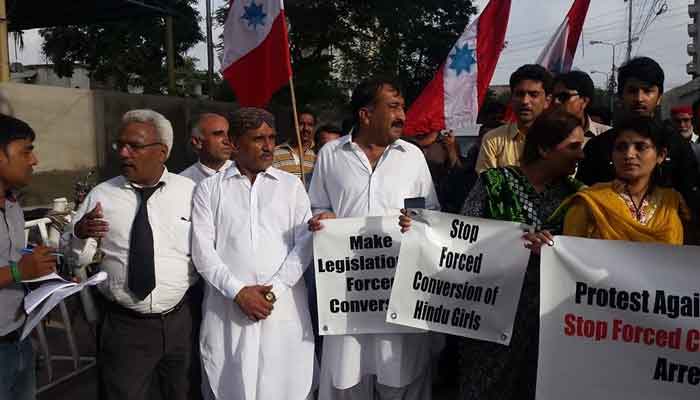Bill against forced conversions be resurrected and passed, demand civil society groups
After recent incidents of alleged abductions of Hindu girls and their forced conversions to Islam, human rights and minority groups have demanded of the Pakistan Peoples Party-led Sindh government to resurrect and pass the bill criminalising forced religious conversions and subsequent forced marriages.
In November 2016, the Sindh Assembly had unanimously passed into law the Sindh Criminal Law (Protection of Minorities) Bill 2015 in a bid to prevent and criminalise forced religious conversions and subsequent forced marriages.
Soon after, the Pakistan Peoples Party leadership succumbed to threats from religious parties, which pressured it to withdraw the proposed law before it could be ratified by the governor.
Under the proposed law, perpetrators could face a minimum of five years and a maximum of life in prison, while minors are forbidden from converting to another religion.
The proposed law was a private bill moved by opposition lawmaker Nand Kumar Goklani of the Pakistan Muslim League-Functional. The bill was passed on the basis of a report of the Standing Committee on Minority Affairs, which had reviewed it.
HRCP’s call
On Friday, the Human Rights Commission of Pakistan (HRCP) has called on the Sindh Assembly to “take swift, serious measures to resurrect and pass the bill criminalising forced conversions”.
After two minor Hindu girls in Ghotki were allegedly abducted and converted forcibly to Islam, the HRCP in the statement has said that it is imperative this bill be passed and steps taken to implement it.
At present, forced conversions are too easily – and too often – disguised as voluntary conversions, leaving minor girls especially vulnerable. The ugly reality of forced conversions is that they are not seen as a crime, much less as a problem that should concern mainstream Pakistan.
The two young girls reportedly abducted in Ghotki are a case in point: that their families were unable to lodge an FIR is shocking. This should be the first line of defence in all such cases.
“The state has a responsibility to all its citizens to protect their freedom of religion or belief. This implies serious introspection into why the 2016 bill against forced conversions was not ratified by the governor at the time, Justice Saeeduzzaman Siddiqui. No reasons were given, nor is it clear whether he returned the bill officially or left it pending,” the statement said.
Equally, the Sindh government should not have given in to pressure from a minority of religious parties which had objected to the bill, it said. “The present Sindh Assembly is morally bound to revisit the bill and ensure it is passed without capitulating to the religious far right or to any individuals or parties that object to its contents or underlying spirit.”
Hindu rights groups
Hindu rights groups have also showed their concerns over the recent incidents of abductions and forced conversions of Hindu girls and demanded from the PPP-led Sindh government to get the bill stopping forced conversions passed immediately.
Sanjesh Dhanja, a leader of the Pakistan Hindu Seva, said that the Hindu community in Daharki and other districts of the province protested against the incidents.
“Cases of abductions, forced conversions and forced marriages of teenaged Hindu girls were on the rise across Sindh,” Dhanja told The News. “It was high time that the provincial administration be pressurised to pass the law immediately and provide security to the non-Muslim communities in the province.”
-
 Sterling K. Brown's Wife Ryan Michelle Bathe Reveals Initial Hesitation Before Taking On New Role
Sterling K. Brown's Wife Ryan Michelle Bathe Reveals Initial Hesitation Before Taking On New Role -
 BAFTA Film Awards Winners: Complete List Of Winners Updating
BAFTA Film Awards Winners: Complete List Of Winners Updating -
 Millie Bobby Brown On Her Desire To Have A Big Brood With Husband Jake Bongiovi
Millie Bobby Brown On Her Desire To Have A Big Brood With Husband Jake Bongiovi -
 Biographer Exposes Aftermath Of Meghan Markle’s Emotional Breakdown
Biographer Exposes Aftermath Of Meghan Markle’s Emotional Breakdown -
 Backstreet Boys Admit Aging Changed Everything Before Shows
Backstreet Boys Admit Aging Changed Everything Before Shows -
 Ryan Coogler Makes Rare Statements About His Impact On 'Black Cinema'
Ryan Coogler Makes Rare Statements About His Impact On 'Black Cinema' -
 Rising Energy Costs Put UK Manufacturing Competitiveness At Risk, Industry Groups Warn
Rising Energy Costs Put UK Manufacturing Competitiveness At Risk, Industry Groups Warn -
 Kate Middleton Makes Glitzy Return To BAFTAs After Cancer Diagnosis
Kate Middleton Makes Glitzy Return To BAFTAs After Cancer Diagnosis -
 NFL Star Rondale Moore Dies Aged 25, Minnesota Vikings Pay Tribute
NFL Star Rondale Moore Dies Aged 25, Minnesota Vikings Pay Tribute -
 Kim Kardashian Makes Huge Career Move Weeks After Going Public With Lewis Hamilton
Kim Kardashian Makes Huge Career Move Weeks After Going Public With Lewis Hamilton -
 Shia LaBeouf Draws Attention For Sweet Reason After Spending Time In Jail Over Brawl Incident Amid Mardi Gras Bash
Shia LaBeouf Draws Attention For Sweet Reason After Spending Time In Jail Over Brawl Incident Amid Mardi Gras Bash -
 Princess Eugenie, Beatrice Receive Strong Warning After Andrew Arrest: 'Zero Tolerance'
Princess Eugenie, Beatrice Receive Strong Warning After Andrew Arrest: 'Zero Tolerance' -
 Rihanna 38th Birthday Detail Breaks The Internet, Featuring Unexpected Huge Item
Rihanna 38th Birthday Detail Breaks The Internet, Featuring Unexpected Huge Item -
 Liza Minnelli Recalls Rare Backstage Memory With Mum Judy Garland In New Memoir
Liza Minnelli Recalls Rare Backstage Memory With Mum Judy Garland In New Memoir -
 Armed Intruder Shot Dead At Trump's Mar-a-Lago Residence: US Secret Service
Armed Intruder Shot Dead At Trump's Mar-a-Lago Residence: US Secret Service -
 Total Lunar Eclipse: What You Need To Know And Where To Watch
Total Lunar Eclipse: What You Need To Know And Where To Watch




